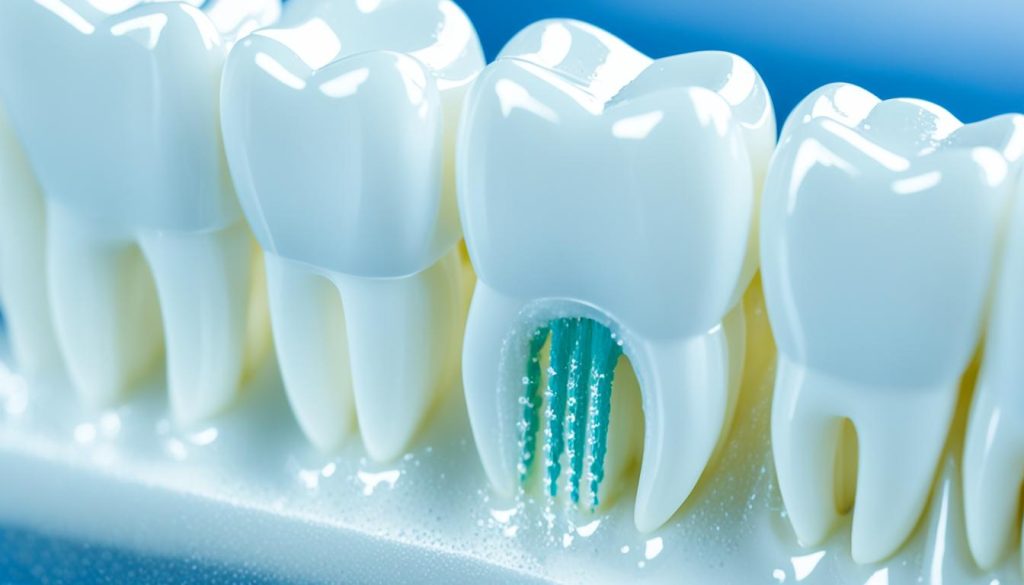When you’re expecting, making healthy choices becomes a top priority. You may find yourself wondering about the safety of certain foods and beverages, such as chai tea. Chai tea is a blend of spices and black tea, known for its rich flavor and warming properties. But is it safe to enjoy during pregnancy?
Understanding the Process of Full Mouth Debridement
During a full mouth debridement, the dentist or dental hygienist will use specialized tools to remove plaque and tartar from all surfaces of the teeth, including the gumline. They may also perform scaling and root planing to smooth the tooth roots and remove any infected tissue. The procedure may require multiple visits depending on the severity of the condition.
Plaque and tartar buildup can lead to various dental problems, such as tooth decay and gum disease. Dental cleaning, also known as teeth cleaning or periodontal maintenance, plays a crucial role in maintaining good oral health.
Let’s take a closer look at the process involved in a full mouth debridement:
- The dentist or dental hygienist will first examine your teeth and gums to evaluate the extent of plaque and tartar buildup.
- Anesthesia might be administered to ensure your comfort during the procedure.
- Specialized dental tools, such as scalers and curettes, will be used to carefully remove plaque and tartar from all tooth surfaces, including hard-to-reach areas.
- Scaling and root planing will be performed to remove infected tissue and smooth the tooth roots.
- The teeth will be polished using a rotating brush or rubber cup with a gritty toothpaste to remove any remaining stains and leave them smooth.
“Full mouth debridement is a comprehensive dental cleaning procedure that targets plaque and tartar buildup on all surfaces of the teeth, including the gumline. By addressing these issues, it helps prevent gum disease and other oral health problems.”
A full mouth debridement procedure is typically recommended for individuals with excessive plaque buildup or signs of gum disease. It provides a deep cleaning that goes beyond regular dental cleanings. The dentist or dental hygienist will assess your oral health condition to determine if a full mouth debridement is necessary.
Now that you have a better understanding of the process involved in full mouth debridement, let’s explore the benefits it offers for your oral health.
The Benefits of Full Mouth Debridement
Full mouth debridement offers several benefits for oral health. It is a dental procedure aimed at removing plaque and tartar buildup, preventing gum disease, and improving oral hygiene. By addressing these issues, full mouth debridement helps to enhance the overall well-being of your mouth.
This treatment plays a crucial role in preventing gum disease, a common oral health condition caused by the accumulation of plaque and tartar. When left untreated, gum disease can lead to inflammation, infection, and even tooth loss. Full mouth debridement effectively removes the excess plaque and tartar, reducing the risk of gum disease development.
Furthermore, full mouth debridement improves oral hygiene by removing harmful bacteria from your teeth and gums. This cleansing process not only promotes fresh breath but also reduces the chance of tooth decay and cavities.
Another advantage of full mouth debridement is its impact on the appearance of your teeth. By eliminating plaque and tartar, this procedure can help restore the natural shine and brightness of your teeth, enhancing your smile.
Ultimately, full mouth debridement is essential for maintaining optimal oral health. It prevents gum disease, improves oral hygiene, reduces bad breath, and enhances the overall appearance of your teeth. Incorporating this treatment into your oral care routine will ensure a healthy and radiant smile.
| Benefits of Full Mouth Debridement |
|---|
| Prevents gum disease |
| Improves oral hygiene |
| Reduces bad breath |
| Enhances the appearance of teeth |
Did you know? Full mouth debridement is often recommended for individuals with excessive plaque buildup, gum disease, or those who have not had regular dental cleanings in a long time.
Who Needs Full Mouth Debridement?
Full mouth debridement is a dental procedure that is essential for individuals who have excessive plaque buildup, gum disease, or those who have not had regular dental cleanings in a long time. It is a highly effective treatment for improving dental hygiene and addressing gum disease symptoms. If you are experiencing bleeding gums, bad breath, or loose teeth, full mouth debridement might be the right solution for you.
During a full mouth debridement, dental professionals use specialized tools to remove plaque and tartar from the teeth and gums, ensuring a thorough cleaning. This procedure goes beyond regular dental cleanings, targeting hidden plaque and preventing the advancement of gum disease.
By undergoing full mouth debridement, you can significantly improve your dental health and reduce the risk of gum disease. It also enhances your overall oral hygiene, leaving you with fresh breath, healthier gums, and a brighter smile.
To determine if you need full mouth debridement, consult with your dentist. They will examine the condition of your teeth and gums, assess the extent of plaque buildup and gum disease, and recommend the appropriate treatment plan. Regular dental check-ups and cleanings, coupled with good oral hygiene practices, are crucial for maintaining the benefits of full mouth debridement.
What to Expect During a Full Mouth Debridement Procedure
When it comes to dental cleaning and gum disease treatment, a full mouth debridement procedure plays a crucial role. Before undergoing this procedure, it’s essential to know what to expect, ensuring a smooth experience at your dental visit.
First and foremost, the dentist or dental hygienist will start the process by conducting a thorough examination of your teeth and gums. This examination helps determine the extent of plaque and tartar buildup, allowing the dental professional to develop an individualized treatment plan.
To ensure your comfort during the procedure, local anesthesia may be administered. This helps to numb the area, relieving any potential discomfort that may arise during the cleaning process.
Once you are comfortable, the dentist will utilize specialized tools to remove the plaque and tartar buildup from all surfaces of your teeth, including the gumline. This meticulous process helps eliminate the bacteria and debris that contribute to gum disease and other oral health concerns.
After the plaque and tartar removal, the dentist will proceed with polishing your teeth using a polishing paste. This step aims to smoothen the teeth and remove any residual stains, leaving your teeth with a smooth and polished finish.
During the entire procedure, the dentist or dental hygienist will ensure your comfort and answer any questions you may have. Open communication is key to creating a positive and stress-free dental experience.
Ultimately, a full mouth debridement procedure guarantees a comprehensive cleaning and gum disease treatment, improving your oral health and overall well-being.
By undergoing a full mouth debridement, you are taking an important step towards maintaining optimal dental hygiene and preventing gum disease. The procedure provides a thorough cleaning, removing plaque and tartar buildup, and promoting a healthy smile.
Aftercare and Maintenance Following Full Mouth Debridement
After undergoing a full mouth debridement, it is crucial to prioritize oral hygiene practices to maintain the results and prevent plaque buildup and gum disease. Here are some essential steps to follow:
- Brush Twice a Day: Use a soft-bristled toothbrush and fluoride toothpaste to thoroughly brush your teeth for two minutes, in the morning and before bedtime. Pay close attention to all surfaces of your teeth, including the gumline.
- Floss Daily: Clean between your teeth and along the gumline using dental floss or interdental brushes. This helps remove plaque and food particles that brushing may miss.
- Use Mouthwash: Rinse with an antimicrobial mouthwash recommended by your dentist to reduce bacteria and freshen your breath. Follow the instructions provided on the product label.
- Attend Regular Check-ups: Schedule routine dental check-ups and cleanings with your dentist. These visits allow your dentist to monitor your oral health, identify any potential issues, and provide professional cleanings to maintain optimal oral hygiene.
By consistently practicing good oral hygiene habits and seeking regular dental care, you can enhance the long-term effectiveness of full mouth debridement and ensure the health of your teeth and gums.
Did You Know? Maintaining a healthy oral hygiene routine can also have a positive impact on your overall health. Research has shown a link between gum disease and various systemic conditions, including heart disease and diabetes.

Risk Factors for Gum Disease
| Risk Factors | Explanation |
|---|---|
| Poor Oral Hygiene | Failure to brush and floss regularly allows plaque and bacteria to accumulate, leading to gum disease. |
| Smoking | Tobacco use weakens the immune system, making it harder for the body to fight off gum infections. |
| Genetics | Some individuals may be more genetically predisposed to developing gum disease. |
| Chronic Illnesses | Certain conditions like diabetes or HIV/AIDS can increase the risk of gum disease. |
| Age | As we age, the risk of gum disease increases due to natural wear and tear on the gums. |
Understanding the risk factors can help you take proactive steps to prevent gum disease and maintain good oral health.
Potential Risks and Complications of Full Mouth Debridement
While full mouth debridement is generally a safe and effective procedure for improving dental hygiene and treating gum disease, there are some potential risks and complications to be aware of. It is important to have a clear understanding of these risks and discuss them with your dentist before undergoing the treatment.
Temporary Sensitivity or Discomfort
After a full mouth debridement, some individuals may experience temporary sensitivity or discomfort in their teeth and gums. This is generally a normal reaction to the deep cleaning process and should resolve within a few days. Your dentist may recommend over-the-counter pain relievers or prescribe medication to alleviate any discomfort.
Bleeding
In rare cases, there may be bleeding of the gums during or after the procedure. This can occur if the gums are inflamed or if there is significant plaque and tartar buildup. Your dentist will take precautions to minimize bleeding, such as using local anesthesia and employing gentle techniques. If bleeding persists or is excessive, it is important to contact your dentist for further evaluation.
Infection
Although uncommon, there is a small risk of infection following a full mouth debridement. This can happen if bacteria enter the bloodstream through the gum tissues. You can minimize the risk of infection by following proper oral hygiene practices and taking any prescribed antibiotics as directed. If you experience symptoms of infection, such as fever, swelling, or severe pain, it is crucial to seek immediate medical attention.
Post-Procedure Instructions
After a full mouth debridement, your dentist will provide you with detailed post-procedure instructions to ensure proper healing and minimize complications. It is essential to follow these instructions diligently, including taking any prescribed medications, avoiding hard or sticky foods, and maintaining good oral hygiene practices. If you have any questions or concerns about the instructions, do not hesitate to reach out to your dentist for clarification.
Full Mouth Debridement vs. Regular Dental Cleanings
When it comes to maintaining optimal oral health, regular dental cleanings are important. But in some cases, a more extensive procedure called full mouth debridement may be necessary. Let’s explore the key differences between the two and understand why full mouth debridement is recommended for individuals with significant plaque buildup or signs of gum disease.
Regular Dental Cleanings
A regular dental cleaning, also known as prophylaxis, focuses on removing surface-level plaque and tartar from the teeth. This preventive procedure is typically performed every six months during your routine dental check-up. The dental hygienist uses specialized tools to gently scrape off the plaque and tartar, followed by thorough polishing to make your teeth shine.
| Regular Dental Cleanings | Full Mouth Debridement |
|---|---|
| Surface-level plaque and tartar removal | Deep cleaning of teeth and gums |
| 6-month intervals | As needed |
| Preventive measure | Treatment for plaque buildup and gum disease |
Full Mouth Debridement
Full mouth debridement, on the other hand, involves a more thorough cleaning of the teeth and gums. This procedure goes beyond the surface and addresses hidden plaque and tartar that can lead to gum disease if left untreated. It is typically recommended when there is significant plaque buildup or signs of gum disease, such as bleeding gums, bad breath, or loose teeth.
During a full mouth debridement, the dentist or dental hygienist uses specialized tools to carefully remove plaque, tartar, and bacteria from all surfaces of the teeth and along the gumline. This deep cleaning helps prevent gum disease, reduces the risk of tooth decay, and improves overall oral health.
Which One Is Right for You?
If you have good oral hygiene habits and minimal plaque buildup, regular dental cleanings may be sufficient to maintain your oral health. However, if you have noticeable plaque buildup or signs of gum disease, full mouth debridement may be necessary to address these issues and prevent further complications.
Your dentist or dental hygienist will evaluate your oral health during your routine check-ups and recommend the appropriate treatment based on your specific needs. It’s important to follow their recommendations and maintain regular dental visits to ensure optimal oral hygiene and prevent potential dental problems.
Remember, whether it’s a regular dental cleaning or a full mouth debridement, maintaining good oral hygiene practices at home, such as brushing twice a day, flossing daily, and using mouthwash, is essential for long-term oral health.
Cost and Insurance Coverage for Full Mouth Debridement
When considering full mouth debridement for your dental hygiene and gum disease treatment, it is important to understand the potential costs involved. The total cost of the procedure can vary based on several factors, including the severity of your condition, your geographical location, and the fees charged by your dentist.
If you have dental insurance, it is a good idea to check whether your plan covers full mouth debridement. Some insurance plans do provide partial coverage for this treatment, while others may require you to pay out-of-pocket. To determine the specific coverage and potential costs, it is recommended to contact your insurance provider directly.
The Cost of Full Mouth Debridement
As mentioned earlier, the cost of full mouth debridement can vary. It typically depends on the extent of plaque buildup and gum disease that needs to be addressed. Additionally, the geographical location and the experience of the dentist can also influence the cost.
“Full mouth debridement is an extensive dental procedure that involves a thorough cleaning of the teeth and gums. Due to the nature of the treatment and the time required, it may be more costly compared to regular dental cleanings.”
While it is challenging to provide an exact cost range without considering individual circumstances, the average cost of full mouth debridement can range from $500 to $2,000. This estimate includes the cost of the cleaning procedure, anesthesia, and any additional treatments that may be required.
Insurance Coverage for Full Mouth Debridement
Insurance coverage for full mouth debridement can vary greatly. Some dental insurance plans may cover a percentage of the cost, while others may have a specific dollar amount set aside for this procedure.
If your insurance plan does cover full mouth debridement, it is important to review the details of your policy to understand any limitations or requirements. This includes checking if pre-authorization or a referral from your primary dentist is necessary.
Keep in mind that even if your insurance covers a portion of the treatment, you may still be responsible for deductibles, copayments, or any fees that exceed the coverage limit. To avoid any surprise expenses, it is best to communicate with your dentist and insurance provider ahead of time.
Financial Planning for Full Mouth Debridement
If the cost of full mouth debridement falls largely on your shoulders, it is essential to plan accordingly. Here are some tips to help manage the financial aspect of the treatment:
- Research: Compare the fees of different dental providers in your area to find the best balance between cost and quality of care.
- Payment options: Ask your dentist if they offer any payment plans or financing options to help spread out the cost over time.
- Saving: If you know in advance that you will require full mouth debridement, consider setting aside a portion of your monthly budget specifically for this purpose.
- Health savings accounts (HSAs) or flexible spending accounts (FSAs): Check if you have an HSA or FSA that can be used to cover some or all of the costs associated with the procedure.
To determine the most accurate cost estimate and understand your insurance coverage fully, it is always recommended to consult with your dentist and insurance provider directly.
| Factors Affecting Cost of Full Mouth Debridement | Cost Range |
|---|---|
| Severity of condition | $500 – $2,000 |
| Geographical location | |
| Dentist’s fees |
Frequently Asked Questions About Full Mouth Debridement
As you consider full mouth debridement as a dental procedure for improving your oral health, you may have some questions in mind. Here are answers to some frequently asked questions:
1. Is full mouth debridement painful?
No, full mouth debridement is typically not a painful procedure. Your dentist or dental hygienist may apply local anesthesia to ensure your comfort during the treatment. After the procedure, you may experience temporary sensitivity or discomfort, but this can be managed with over-the-counter pain relievers.
2. How long does a full mouth debridement procedure take?
The duration of a full mouth debridement procedure can vary depending on the severity of plaque buildup and gum disease. In general, it may take between one to two hours. However, for more complex cases, multiple visits may be required to complete the treatment.
3. How often should I get a full mouth debridement?
The frequency of full mouth debridement depends on your individual oral health needs. If you have excessive plaque buildup or gum disease, your dentist may recommend a full mouth debridement as a one-time treatment or as part of a periodontal maintenance program. Regular dental check-ups and cleanings are crucial to maintaining optimal oral health.
4. Will my dental insurance cover full mouth debridement?
While coverage varies depending on your dental insurance plan, many insurance providers do offer coverage for full mouth debridement. It is important to check with your insurance provider to understand your specific coverage and any out-of-pocket expenses that may apply.
5. What can I expect after a full mouth debridement?
After a full mouth debridement, it is normal to experience some temporary sensitivity or discomfort. Your dentist may recommend using a special mouthwash or provide post-procedure instructions to aid in healing and maintain good oral hygiene. It is important to follow these instructions and continue practicing regular oral care at home.
Now that you have a better understanding of full mouth debridement and its benefits, you can make an informed decision about whether this procedure is right for you. Remember to consult with your dentist or dental hygienist for personalized advice and recommendations.
Conclusion
Full mouth debridement is a valuable dental procedure that plays a crucial role in maintaining optimal oral health. By removing plaque, tartar, and bacteria from the teeth and gums, it helps prevent gum disease and reduces the risk of tooth decay.
Regular dental check-ups and cleanings, combined with good dental hygiene practices, are essential for preserving the benefits of full mouth debridement. Brushing your teeth twice a day with a soft-bristled toothbrush, flossing daily, and using mouthwash recommended by your dentist can help maintain a healthy smile.
Remember that oral health is an integral part of your overall well-being. By prioritizing full mouth debridement and maintaining good dental hygiene, you can enjoy a bright, healthy smile and prevent potential oral health issues in the future.







